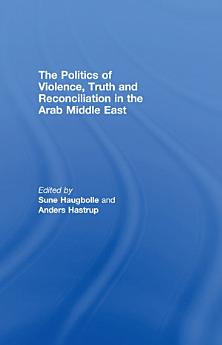The Politics of Violence, Truth and Reconciliation in the Arab Middle East
About this ebook
The analysis departs from a liberal, teleological understanding of truth and reconciliation as a linear process from trauma through memory to national healing. Instead, the articles highlight how the interplay between state-orchestrated initiatives (such as Truth and Reconciliation committees and ministerial committees); civil society actors (including former political prisoners, investigative journalists and NGOs); and external actors (such as transnational NGOs, state sponsored dialogue initiatives, the UN and the EU) is creating a new political field.
The book examines the extent to which this field challenges the Arab nation-state’s monopoly on history and violence, and asks whether public narratives of violence, memory and justice consolidate or challenge political legitimacy of current regimes.
This book was published as a special issue of Mediterranean Politics.
About the author
Sune Haugbolle is Assistant Professor in Modern Islam and Middle East Studies at the Department of Cross-cultural and Regional Studies, University of Copenhagen. D.Phil., M.St., University of Oxford. He has published various articles on modern Lebanon, including "Spatial Transformations in the Lebanese 'Independence Intifada'," Arab Studies vol.12, no.3 (2006).
Anders Hastrup is a Fellow at the University of Copenhagen. He is formerly Field Coordinator, Assistant Camp Coordinator and advisor for different NGOs in Darfur, Sudan and affiliated with The Danish Institute for International Studies. He is the author of the Master's thesis 'Displacing Darfur. Purity and Danger in Sudan's Latest Civil War'.




